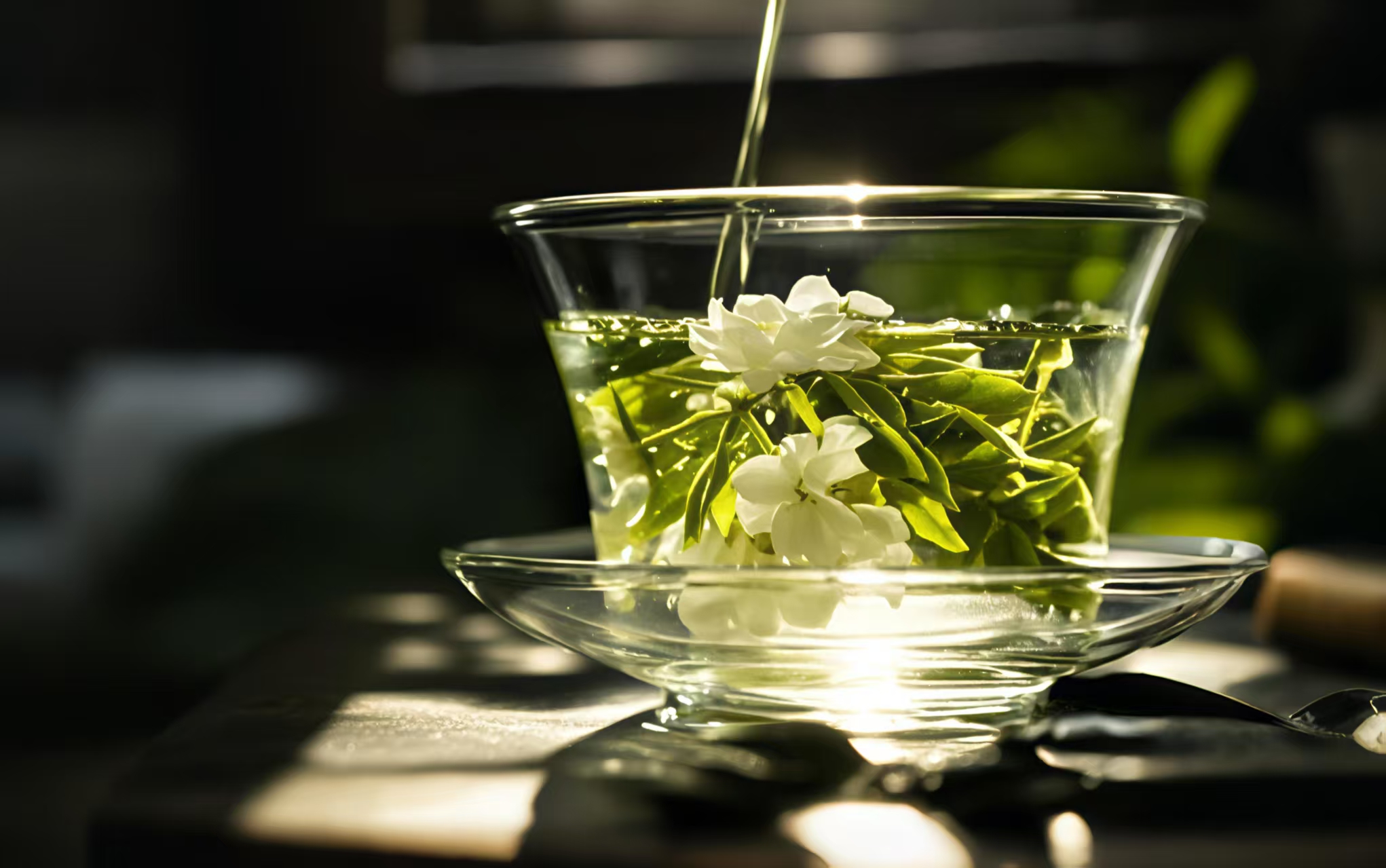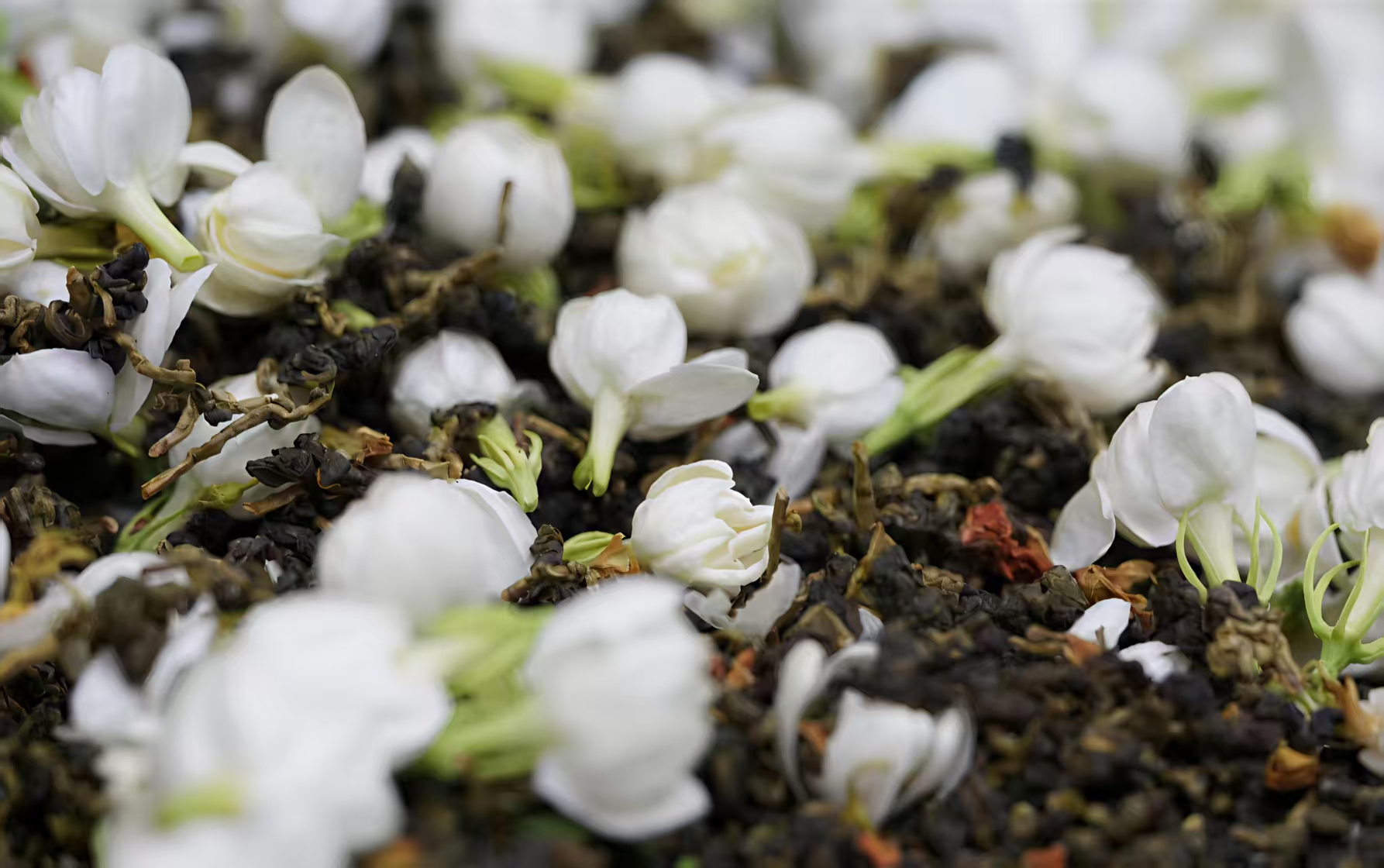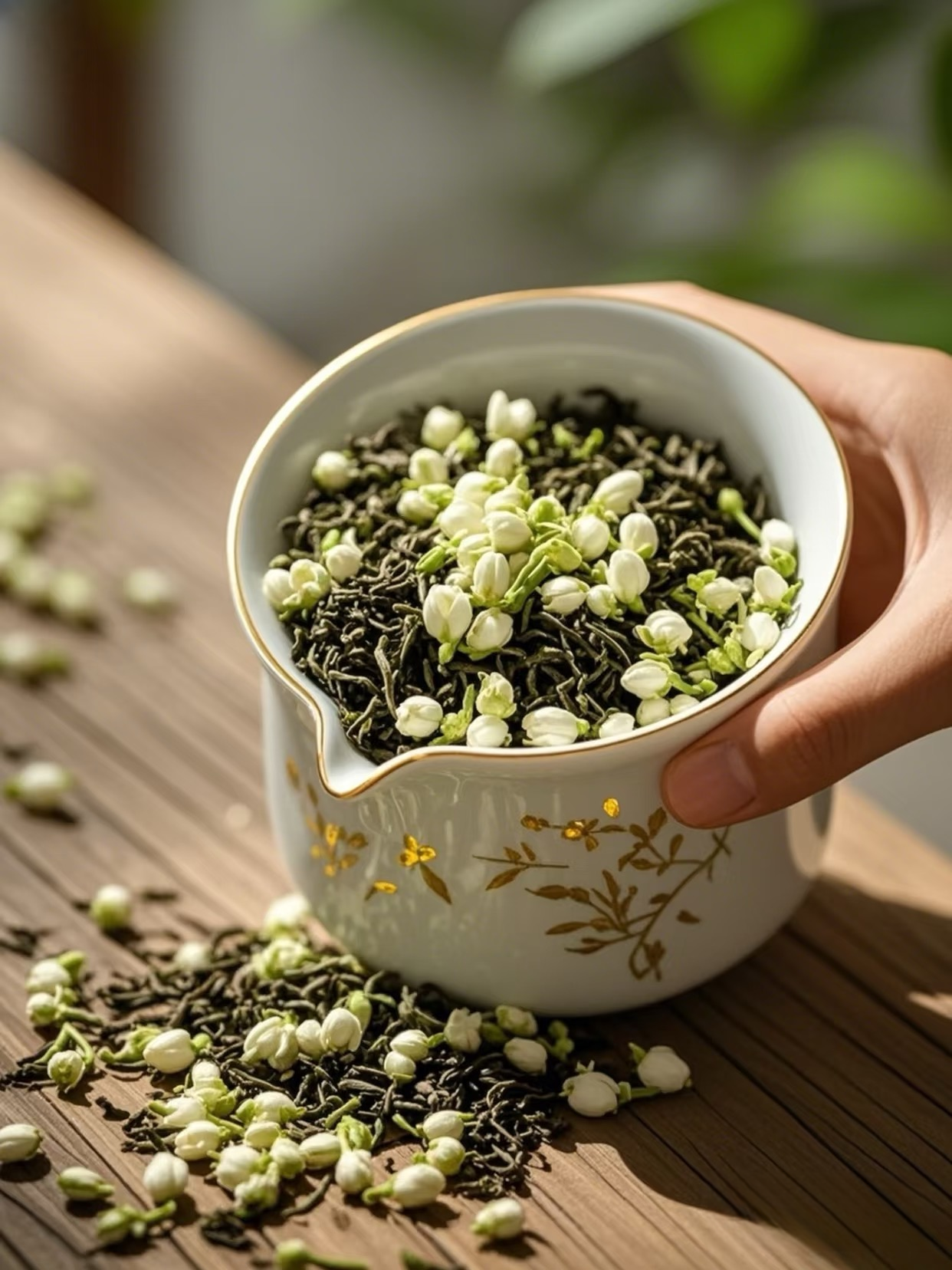Have you ever wondered what makes jasmine tea so special? This delightful beverage combines the natural fragrance of jasmine flowers with the rich taste of tea leaves, creating a unique blend that’s both soothing and aromatic. Whether you’re sipping on jasmine green tea or exploring other varieties like white, oolong, or black teas, there’s something magical about its floral notes.

Here’s something interesting:
-
The jasmine tea market is booming, especially in the green tea segment.
-
Online stores and supermarkets are seeing a surge in demand for this aromatic tea.
-
You’ll find jasmine tea available in several types, including green, black, and white tea.
If you’re curious about jasmine tea 101 or what-is-jasmine-tea, you’re in for a treat. And if you’re wondering what-is-the-best-jasmine-tea to try is, the versatility of jasmine makes it a favorite for tea lovers worldwide. So, why not brew a cup and experience its charm?
Key Takeaways
-
Jasmine tea mixes the smell of jasmine flowers with tea. It creates a calming and nice-smelling drink.
-
There are many types of jasmine tea, like green, white, oolong, and black. Each has its own taste and smell for different likes.
-
The old way of making jasmine tea makes it taste better. Fresh jasmine flowers are placed with tea leaves to give a pure flavor.
-
Jasmine tea has antioxidants that help your body. It can lower stress and make you feel happier. It's a good drink for daily life.
-
To pick good jasmine tea, look for whole leaves. Check for natural smells and old scenting methods for the best taste.
Jasmine Tea 101: Understanding Its Varieties
When it comes to jasmine tea, the variety you choose can make all the difference in your tea-drinking experience. Each type offers a unique flavor profile and aroma, making it a delightful journey for your taste buds. Let’s dive into three popular varieties: jasmine green tea, jasmine white tea, jasmine oolong tea, and jasmine black tea.
Jasmine Green Tea
Jasmine green tea is one of the most popular types of jasmine tea. It combines the fresh, grassy notes of green tea with the sweet, floral aroma of jasmine. This variety is perfect if you’re looking for a refreshing and aromatic cup of tea. The scenting process involves layering green tea leaves with jasmine flowers, allowing the tea to absorb the delicate fragrance.
What makes jasmine green tea stand out? Research has identified 25 key volatile compounds that contribute to its unique aroma and quality. These compounds, combined with the right amount of jasmine flowers—typically between 80% and 120%—enhance the tea’s flavor and fragrance. This balance creates a harmonious blend that’s both soothing and invigorating.
If you’re new to jasmine tea, jasmine green tea is a great place to start. Its light and refreshing taste makes it a favorite among tea enthusiasts.
Jasmine White Tea
Jasmine white tea is the epitome of elegance. Made from young tea leaves and buds, this variety has a delicate flavor and a subtle floral aroma. The scenting process for jasmine white tea is similar to other types, but the base tea is less processed, preserving its natural sweetness and lightness.
This tea is perfect if you enjoy a mild and soothing cup. It’s also a great choice for those who appreciate the simplicity and purity of jasmine tea.
Jasmine Oolong Tea
Jasmine oolong tea offers a unique twist on traditional jasmine tea. Oolong tea is partially oxidized, giving it a flavor profile that falls between green and black tea. When combined with jasmine, it creates a rich and complex cup with floral and fruity undertones.
This variety is ideal if you’re looking for something bold yet balanced. The floral aroma of jasmine complements the robust flavor of oolong tea, making it a delightful choice for tea lovers who enjoy exploring different types of jasmine tea. Whether you prefer it hot or iced, jasmine oolong tea is a versatile option that never disappoints.
Jasmine Black Tea
If you’re looking for a bold and flavorful twist on jasmine tea, jasmine black tea might be your next favorite. This variety combines the robust, full-bodied taste of black tea with the delicate floral aroma of jasmine. It’s perfect for those moments when you want a tea that’s both comforting and energizing.
Here’s what makes jasmine black tea stand out:
-
Rich Flavor: Black tea has a stronger taste compared to green or white tea. When paired with jasmine, it creates a balanced blend of earthy and floral notes.
-
Higher Caffeine Content: Need a little pick-me-up? Jasmine black tea contains more caffeine than other jasmine tea varieties, making it a great choice for mornings or mid-day boosts.
-
Versatility: You can enjoy it hot or iced. Add a splash of milk or a drizzle of honey for a creamy, sweet twist.
Tip: To get the best flavor, brew jasmine black tea at a slightly higher temperature (around 200°F) for 3-5 minutes. This ensures the boldness of the black tea shines through while preserving the jasmine aroma.
The scenting process for jasmine black tea is similar to other varieties. Tea leaves are layered with fresh jasmine flowers, allowing the fragrance to infuse naturally. This traditional method ensures every sip delivers the perfect balance of strength and sweetness.
Whether you’re a seasoned tea drinker or just starting your jasmine tea journey, jasmine black tea offers a unique experience. Its bold flavor and floral aroma make it a versatile option for any occasion.
How Jasmine Tea Is Made

Ever wondered how jasmine tea gets its enchanting aroma? The process is a fascinating blend of tradition, precision, and artistry. Let’s take a closer look at how this beloved tea is crafted.
The Scenting Process
The magic of jasmine tea lies in its scenting process. This traditional method involves layering tea leaves with freshly-picked jasmine flowers. As the flowers release their fragrance, the tea absorbs the aroma, creating a harmonious blend of floral and tea notes. This process can be repeated multiple times (5-13 times) to enhance the flavor and aroma.
Traditional Scenting Process Without Any Additives
The traditional scenting process is a labor of love. Here’s how it works:
-
Fresh Flowers Only: High-quality jasmine tea uses fresh jasmine buds, not wilted ones or artificial flavorings.
-
Multi-Day Scenting: The tea leaves and flowers are layered together for several days, allowing the tea to fully absorb the fragrance.
-
No Additives: Unlike some modern methods, traditional scenting relies solely on the natural aroma of the flowers, ensuring a pure and authentic flavor.
This meticulous process is labor-intensive but worth it. It’s what gives jasmine tea its signature aroma and sets it apart from lower-quality versions.
Did you know? The earliest records of tea scenting date back to 1049 BC, with jasmine tea becoming a common commodity by the Qing Dynasty. That’s centuries of perfecting this art!
The Role of Jasmine Flowers
Jasmine flowers are the heart and soul of jasmine tea. Their role goes beyond just adding fragrance—they define the tea’s flavor profile. The flowers are picked early in the morning when their fragrance is at its peak. They’re then layered with tea leaves, allowing the blossoms to release their aroma as they bloom.
Botanical studies show that this layering process is crucial. The tea leaves absorb the aromatic compounds from the flowers, creating a delicate balance of floral and tea flavors. This process can be repeated up to seven times for premium jasmine tea, ensuring every sip is a sensory delight.
At In-JoyTea, we’re passionate about jasmine tea. It’s not just a product for us—it’s our mission. Here’s what makes us unique:
-
Standardized Process: We’ve perfected the art of jasmine tea-making, from sourcing the finest tea leaves to selecting the best jasmine flower buds.
-
Transparency: We believe in opening up the process to all jasmine tea lovers. You can trust that every step, from flower selection to scenting, meets the highest standards.
-
Exclusive Focus: Unlike other brands, we specialize in jasmine tea. This dedication allows us to create premium blends that stand out in quality and flavor.
When you choose In-JoyTea, you’re not just buying tea—you’re experiencing the result of centuries of tradition, combined with modern innovation and a deep love for jasmine.
The Flavor Profile and Caffeine Content of Jasmine Tea
The Floral Aroma and Delicate Taste
When you take your first sip of jasmine tea, you’ll notice its enchanting floral aroma. This tea is celebrated for its naturally sweet fragrance, which comes from the infusion of jasmine flowers. The flavor profile is a perfect balance of floral and tea notes, offering a soothing experience from the first sip to the lingering aftertaste. High-quality jasmine teas often have a pale green appearance with fine hairs, a sign of their delicate flavor and craftsmanship.
Here’s a quick breakdown of what makes jasmine tea so special:
|
Aspect |
Description |
|---|---|
|
Aroma |
Naturally sweet with the fragrance of jasmine flowers. |
|
Taste Profile |
Balanced and consistent, from the first sip to the aftertaste. |
|
Appearance |
Pale green with fine hairs, indicating high quality and contributing to the delicate flavor. |
Many tea lovers appreciate how jasmine tea maintains its fragrance across multiple infusions. This consistency, combined with the calming effect of its floral aroma, makes it a favorite for moments of relaxation. Whether you’re enjoying it hot or iced, jasmine tea offers a sensory experience that’s hard to match.
Caffeine Levels in Different Varieties
The caffeine content in jasmine tea varies depending on the type of tea used as the base. If you’re looking for a gentle boost, jasmine white tea might be your go-to, with its lower caffeine levels. On the other hand, jasmine oolong tea offers a stronger kick, perfect for when you need more energy.
Here’s a handy guide to the caffeine content in different varieties of jasmine tea:
|
Tea Variety |
Notes |
|
|---|---|---|
|
Jasmine Green Tea |
20-45 |
Varies with specific green tea types and growing conditions. |
|
Jasmine White Tea |
10-25 |
Depends on the part of the plant used; young buds have more caffeine. |
|
Jasmine Oolong Tea |
30-50 |
Caffeine levels influenced by oxidation; can reach up to 75 mg per 8 ounces. |
|
Jasmine Pu-erh Tea |
15-30 |
Varies widely; fermentation and aging affect caffeine levels significantly. |
If you’re sensitive to caffeine, jasmine white tea or jasmine pu-erh tea might be the best options. For a more robust flavor and higher caffeine, jasmine oolong tea is an excellent choice. No matter which variety you choose, jasmine tea offers a delightful combination of taste and energy.
Health Benefits of Jasmine Tea
Jasmine tea isn’t just a treat for your taste buds—it’s also packed with amazing health benefits. Let’s explore how this fragrant tea can support your well-being.
Antioxidant Properties
One of the standout benefits of jasmine tea is its rich antioxidant content. These antioxidants, especially polyphenols and catechins like EGCG, play a vital role in protecting your body from free radical damage. Free radicals can harm your cells and speed up aging, but antioxidants help neutralize them, keeping you healthier.
Research has shown that jasmine tea extract can even protect human retinal cells from UVB damage. This highlights how powerful its antioxidants are in promoting cell survival and reducing oxidative stress. Drinking jasmine tea regularly may also support your skin, heart, and brain health by reducing inflammation and boosting your body’s natural defenses.
Stress Relief and Relaxation
Ever noticed how a warm cup of jasmine tea can instantly calm your mind? That’s not just in your head—jasmine tea is known for its soothing properties. The floral aroma of jasmine herbal tea has a natural calming effect, helping to reduce stress and promote relaxation. It’s like a mini escape from the chaos of daily life.
Sipping on jasmine tea can also improve your mood. The act of brewing and enjoying this tea creates a mindful moment, giving you a chance to pause and recharge. Whether you’re winding down after a long day or starting your morning with a peaceful ritual, jasmine tea can be your go-to for relaxation.
Potential Side Effects to Consider
While jasmine tea offers plenty of benefits, it’s important to be aware of potential side effects. For instance, the caffeine content in jasmine tea can cause restlessness or insomnia if you’re sensitive to it. Drinking too much may also lead to an upset stomach, especially on an empty stomach.
If you’re pregnant or breastfeeding, consult your doctor before adding jasmine tea to your routine. And remember, moderation is key. Enjoying jasmine herbal tea in reasonable amounts ensures you get the benefits without any unwanted effects.
Tip: If you’re sensitive to caffeine, opt for jasmine herbal tea varieties with lower caffeine levels, like jasmine white tea.
Drinking Jasmine Tea: How to Choose, Brew, and Enjoy

Tips for Selecting High-Quality Jasmine Tea
Choosing the best jasmine tea can feel overwhelming with so many options available. But don’t worry—there are a few simple tips to help you pick quality jasmine teas every time. First, look for teas that use whole leaves rather than tea dust or fannings. Whole leaves retain more flavor and aroma, giving you a richer experience.
Next, check the scent. High-quality jasmine teas have a natural floral fragrance, not an overpowering or artificial smell. If possible, opt for teas that use traditional scenting methods with fresh jasmine flowers. This ensures a pure and authentic taste. Lastly, pay attention to the appearance. Jasmine blooming teas, for example, should have tightly rolled leaves or buds that unfurl beautifully when steeped.
Brewing Techniques for the Perfect Cup
Brewing jasmine tea the right way can make all the difference in flavor. The key is to match the water temperature and steeping time to the type of tea you’re using. Here’s a quick guide to help you brew the perfect cup:
|
Type of Jasmine Tea |
Water Temperature (°F) |
Steeping Time |
|---|---|---|
|
Black or Oolong |
208 |
2-3 minutes |
|
White or Green |
175 |
15 seconds |
Always use fresh, filtered water for the best results. Avoid over-steeping, as it can make the tea taste bitter. And remember, jasmine blooming teas are not just about flavor—they’re a visual treat. Use a glass teapot to watch the leaves unfurl for a truly relaxing experience.
Jasmine tea is more than just a drink—it’s an experience. Its rich history, fragrant aroma, and variety of flavors make it a favorite for tea lovers everywhere. Whether you prefer the lightness of jasmine green tea or the boldness of jasmine black tea, there’s a type for every mood and moment.
Why is jasmine tea so popular?
-
Its health benefits, like antioxidants and stress relief, are widely recognized.
-
Specialty teas, including jasmine, are gaining attention for their premium quality.
-
The wellness industry promotes jasmine tea as part of a healthy lifestyle.
By choosing premium jasmine tea and brewing it with care, you can fully enjoy its delicate flavor and soothing aroma. At In-JoyTea, we’re proud to focus exclusively on jasmine tea, ensuring every cup delivers an exceptional experience. So, why not make jasmine tea a part of your daily routine?
FAQ
What makes jasmine tea different from other teas?
Jasmine tea stands out because of its floral aroma. The scenting process infuses tea leaves with jasmine flowers, creating a unique blend of fragrance and flavor. It’s perfect for moments when you want a soothing yet refreshing drink.
Can jasmine tea help with relaxation?
Absolutely! The natural aroma of jasmine tea has calming effects. Drinking it can reduce stress and improve your mood. It’s a great choice for unwinding after a busy day or creating a peaceful morning ritual.
Is jasmine tea high in caffeine?
The caffeine content depends on the base tea. Jasmine green tea has moderate levels, while jasmine black tea contains more. If you prefer less caffeine, jasmine white tea or green tea are better options.
How should I store jasmine tea?
Keep jasmine tea in an airtight container away from light, heat, and moisture. This preserves its aroma and flavor. A cool, dry place like a pantry works best for maintaining its quality.
Can I drink jasmine tea every day?
Yes, you can enjoy jasmine tea daily. It’s packed with antioxidants and offers health benefits like stress relief. Just be mindful of caffeine levels if you’re sensitive to it or drinking it late at night.











































































































